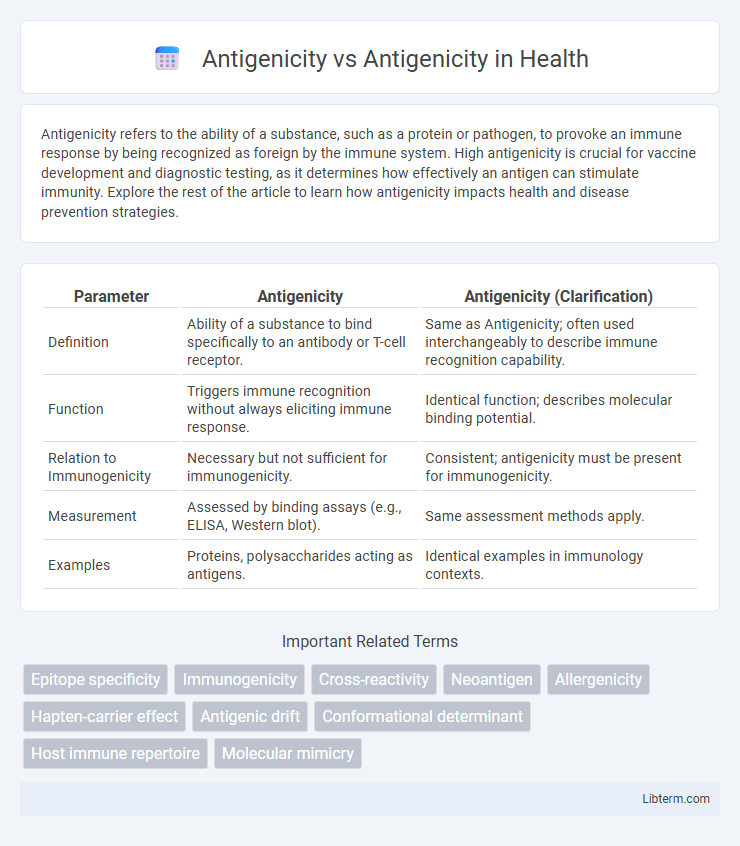Antigenicity refers to the ability of a substance, such as a protein or pathogen, to provoke an immune response by being recognized as foreign by the immune system. High antigenicity is crucial for vaccine development and diagnostic testing, as it determines how effectively an antigen can stimulate immunity. Explore the rest of the article to learn how antigenicity impacts health and disease prevention strategies.
Table of Comparison
| Parameter | Antigenicity | Antigenicity (Clarification) |
|---|---|---|
| Definition | Ability of a substance to bind specifically to an antibody or T-cell receptor. | Same as Antigenicity; often used interchangeably to describe immune recognition capability. |
| Function | Triggers immune recognition without always eliciting immune response. | Identical function; describes molecular binding potential. |
| Relation to Immunogenicity | Necessary but not sufficient for immunogenicity. | Consistent; antigenicity must be present for immunogenicity. |
| Measurement | Assessed by binding assays (e.g., ELISA, Western blot). | Same assessment methods apply. |
| Examples | Proteins, polysaccharides acting as antigens. | Identical examples in immunology contexts. |
Understanding Antigenicity: A Comprehensive Overview
Antigenicity refers to the ability of a substance, such as a protein or polysaccharide, to specifically bind to an antibody or a T-cell receptor, initiating an immune response. It is distinct from immunogenicity, which describes the capacity to induce an immune response, highlighting that not all antigens are equally immunogenic. Understanding antigenicity involves analyzing molecular structures, epitopes, and the interactions that determine antibody specificity and binding affinity, critical for vaccine design and immunodiagnostics.
Defining Antigenicity: Key Concepts and Terminologies
Antigenicity refers to the ability of a substance, usually a protein or polysaccharide, to specifically bind to an antibody or a T-cell receptor, triggering an immune response. It is distinct from immunogenicity, which describes the ability to induce a full immune response, including the activation of immune cells. Key terminologies include epitopes, the specific parts of an antigen recognized by the immune system, and haptens, small molecules that become antigenic only when attached to larger carriers.
Biological Importance of Antigenicity
Antigenicity refers to the ability of a substance to specifically bind to an antibody or a T-cell receptor, playing a crucial role in immune recognition and response. Its biological importance lies in initiating adaptive immunity by enabling the immune system to identify and target pathogens, such as viruses and bacteria. High antigenicity ensures effective vaccine development and immunotherapy by eliciting a strong and specific immune reaction.
Factors Influencing Antigenicity
Factors influencing antigenicity include molecular size, with larger molecules typically eliciting stronger immune responses due to increased epitope availability. Chemical complexity also plays a crucial role, as molecules with diverse structures and configurations present more unique antigenic determinants recognized by the immune system. Furthermore, the foreignness of a substance to the host organism significantly impacts antigenicity, where antigens markedly different from the host's own molecules trigger more robust immune reactions.
Measuring Antigenicity: Methods and Techniques
Measuring antigenicity involves evaluating the ability of a substance to bind specifically to antibodies or T-cell receptors, using techniques such as enzyme-linked immunosorbent assays (ELISA), surface plasmon resonance (SPR), and flow cytometry. ELISA quantifies antigen-antibody interactions with high sensitivity, while SPR provides real-time binding kinetics without labeling. Flow cytometry analyzes antigen expression on cell surfaces, enabling precise quantification of antigenicity in heterogeneous cell populations.
Antigenicity in Immunology and Vaccine Development
Antigenicity in immunology refers to the ability of a substance, such as a protein or polysaccharide, to specifically bind to immune receptors like antibodies or T-cell receptors, triggering an immune response. High antigenicity is crucial in vaccine development to ensure the vaccine elicits strong and specific immunity against pathogens by promoting immunological memory. Understanding the molecular basis of antigenicity aids in designing effective vaccines with robust protective efficacy against infectious diseases.
Antigenicity vs. Immunogenicity: Clarifying the Differences
Antigenicity refers to the ability of a substance to specifically bind to immune receptors such as antibodies or T-cell receptors, whereas immunogenicity denotes the capacity to induce a full immune response, including the activation of immune cells. While all immunogens are antigens, not all antigens are immunogens; for instance, haptens exhibit antigenicity without immunogenicity unless attached to a carrier molecule. Understanding the distinction between antigenicity and immunogenicity is crucial in vaccine development, where both the recognition of the antigen and the subsequent activation of the immune system are essential for effective protection.
Clinical Implications of Altered Antigenicity
Altered antigenicity can significantly impact clinical outcomes by affecting immune recognition and response, often leading to challenges in vaccine efficacy and autoimmune disease management. Changes in antigenic profiles may result in immune escape mechanisms in pathogens or tumor cells, complicating diagnosis and treatment strategies. Understanding these variations is critical for developing targeted immunotherapies and improving patient-specific clinical interventions.
Challenges in Studying Antigenicity
Challenges in studying antigenicity include the complex molecular interactions between antigens and immune receptors, which require advanced analytical techniques such as X-ray crystallography and surface plasmon resonance. Variability in antigen structure due to mutations or post-translational modifications further complicates accurate characterization. Additionally, the influence of the host's genetic background and immune system heterogeneity poses significant difficulties in standardizing antigenicity assessments.
Future Directions in Antigenicity Research
Future directions in antigenicity research emphasize the integration of advanced computational models and machine learning algorithms to predict antigen-antibody interactions with higher accuracy. Innovations in high-throughput screening and omics technologies are enabling the identification of novel antigenic determinants, accelerating vaccine design and personalized immunotherapies. Expanding our understanding of antigenic variation and immune escape mechanisms will drive the development of next-generation diagnostics and targeted treatments for infectious diseases and cancer.
Antigenicity Infographic

 libterm.com
libterm.com